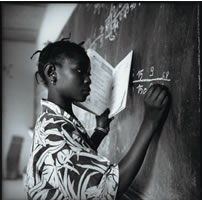In Niger women represent 50,4 % of the population but do not get their share of social and economic benefits. Disparities are found in in their legal status and in all domains: access to resources, employment, health, education etc... Women in Niger are generally poor and very vulnerable.
In Niger poverty mainly affects rural women.
Niger women live in precarious physical, material and social conditions, owing to social and cultural handicaps and to discriminatory traditions that trap them in lower positions than men. Contrary to men, who carry more weight in decision making and hold key roles in public life, women are on the margin of society. They represent a significant part of the population (50,14%), yet they have little or no power in decision-making and can rarely control family finances.
Women’s illiteracy and poverty is flagrant in Niger :
- The proportion of women aged 15 to 49 who haven’t had any schooling is higher than that of men in the same age group (84% of women against 69% of men).
- According to PNUD (human poverty, 2007) the social situation in Niger is characterised by a state of poverty that highly threatens political stability, social cohesion and balance within the country’s ecosystems. According to the available data, 63% of the population lives below the monetary poverty line (75,000 F CFA and 50,000 F CFA respectively in urban and rural areas). Nearly two thirds of Niger citizens are poor, over four fifths of paupers live in rural areas and three quarters of paupers are housewives.
Rural women are kept in the background because they are often unable to take advantage of basic social services. Illiterate, lacking economic power they are unfit to participate actively in development actions. Thus, rural women feel ‘useless’, relegated in the family, unable to give out anything to others.
Inequalities in the economy
Economically the difficult access to land ownership, bank
loans and employment are the main causes of gender inequalities, women’s access to land ownership is limited, the rural code is not enforce, and in many cases women can’t benefit from the profits from crops.
Inequalities in legal status
Even if progress has been achieved, the legal framework is
currently inadequate, and the Family Code does not exist. The two
following examples reflect the situation; Niger did not ratify the whole text and expressed reservations to the convention
CEDAW, (Convention on the Elimination of all forms of Discrimination Against Women) approved by the United Nations, and to the additional protocol to the African chart of human rights.
By ordnance n°99-30 on August 13th 1999 Niger expressed 5 reservations on the Convention adopted on December 18th 1976 in New-York
The following measures have not been adopted by Niger:
- Niger does not recognise to men and women the same rights and responsibiblies in deciding freely and responsibly the number and spacing of births, the right to choose the family name, .
- Niger does not recognise to men and women the same rights and responsibilites during marriage and at its dissolution.
The following dispositions have not been adopted by Niger - the minimum age to get married,
- the equal sharing of inheritance,
- the choice of residence.
Some groups criticize such measures as going against the Islamic practices and traditional customs. These reservations seriously weaken the CEDAW and the additional protocol and slow down the process toward equality and the autonomy of women, so that even when the laws favour women’s advancement, inequalities persist in their implementation.
Socio-cultural obstacles
Inequalities still exist in real life. Early marriages, precarious health, low education, reduced access to the land owners, non application of the rural code and no profit sharing of the crops are amongst the obstacles to the fulfillment of the Nigerien woman.
Generally, traditions run counter to the evolution of women’s rights.


